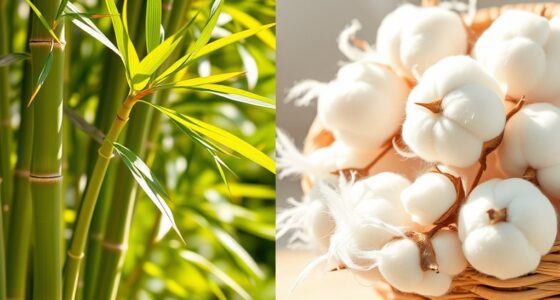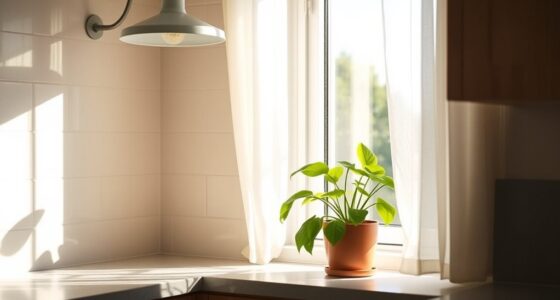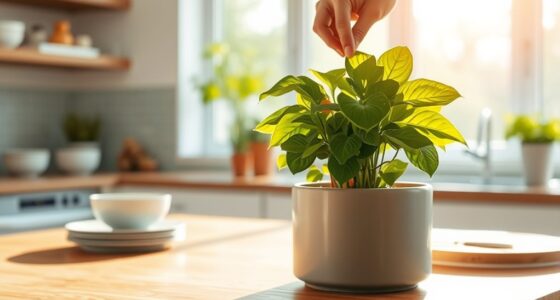To make your own eco-friendly cleaning products at home, gather natural ingredients like vinegar, baking soda, castile soap, and essential oils such as lemon or tea tree. Mix these simple ingredients to create safe, effective cleaners for different surfaces, including glass, kitchen, and bathroom areas. Be sure to set up a clean workspace and store your solutions properly. Keep learning how to craft versatile, sustainable cleaners that work well and protect your home and the environment.
Key Takeaways
- Use natural, biodegradable ingredients like vinegar, baking soda, castile soap, and essential oils to craft effective cleaners.
- Mix vinegar, water, and essential oils for versatile disinfectants; add baking soda for deodorizing and scrubbing.
- Follow safety guidelines by wearing protective gear, organizing your workspace, and storing solutions out of children’s reach.
- Label all homemade cleaners clearly with ingredients, dilution ratios, and safety instructions for safe use.
- Regularly inspect and dispose of expired or discolored solutions to maintain safety and effectiveness.
Understanding the Benefits of Homemade Eco-Friendly Cleaners
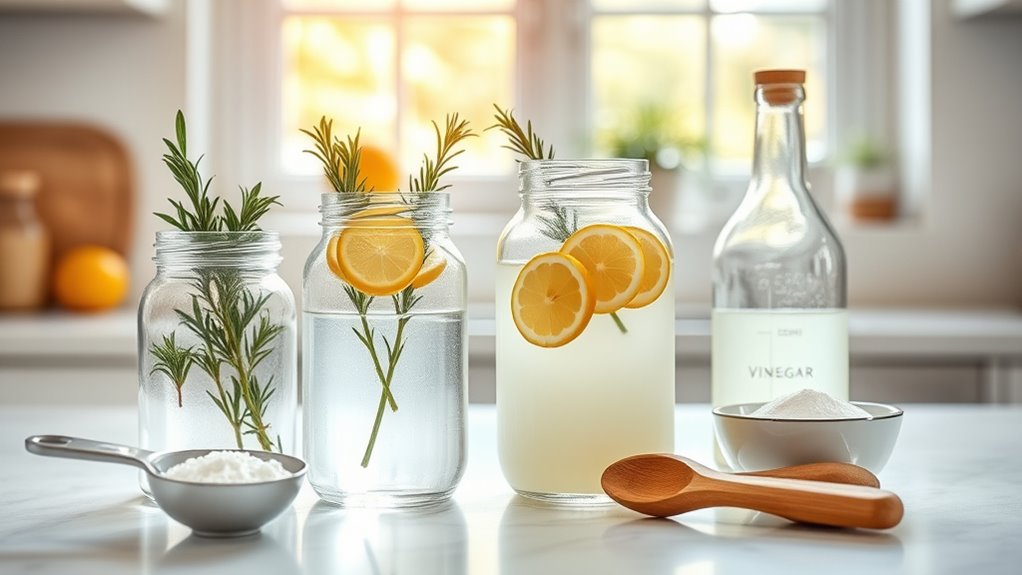
Have you ever wondered why homemade eco-friendly cleaners are gaining popularity? It’s because they’re made from natural ingredients like vinegar, baking soda, and castile soap that are biodegradable and non-toxic. Using DIY cleaners reduces your household’s exposure to harmful chemicals linked to health issues such as allergies, asthma, and hormone disruption. These chemical-free solutions also lessen environmental impact by cutting down on plastic waste and preventing toxic substances from polluting water sources and harming wildlife. Furthermore, biodegradable ingredients break down more easily in the environment, reducing pollution. Plus, studies show that many natural ingredients in DIY cleaners work just as well as conventional chemical cleaners for most household tasks. By choosing homemade, eco-friendly cleaning options, you protect your health and help the environment—all while keeping your home clean and safe. Incorporating natural cleaning ingredients like lemon juice and essential oils can further enhance cleaning effectiveness without compromising safety. Additionally, understanding environmental benefits can motivate more sustainable cleaning habits. Regularly making your own cleaners encourages reduction of plastic waste, supporting a more sustainable lifestyle.
Essential Ingredients for Natural Cleaning Solutions
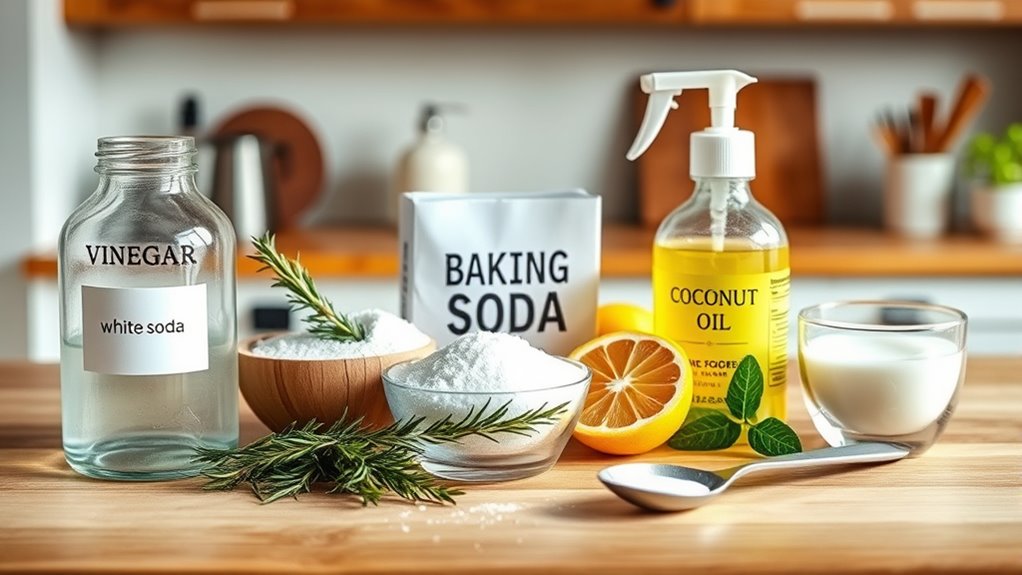
You can create effective cleaning solutions using common household ingredients like vinegar, baking soda, and castile soap, which are safe and affordable. Natural disinfectants and deodorizers, such as essential oils like tea tree and lemon, boost cleaning power while adding pleasant scents. These ingredients serve as safer alternatives and substitutes for harsh chemicals, making your cleaning routine eco-friendly and healthy. Additionally, using natural ingredients aligns with eco-conscious practices and reduces environmental impact. Incorporating essential oils with antimicrobial properties, such as tea tree and eucalyptus, can further enhance the disinfecting effectiveness of your homemade cleaners. Embracing sustainable cleaning methods also supports broader environmental conservation efforts. It is also beneficial to understand how biodegradable substances break down naturally without harming ecosystems.
Common Household Ingredients
Common household ingredients form the backbone of natural cleaning solutions, offering effective and eco-friendly alternatives to commercial products. Vinegar, with its acetic acid, works as a natural disinfectant and degreaser, tackling mold, bacteria, and mineral deposits. Baking soda is a gentle abrasive that deodorizes, removes stains, and softens surfaces. Castile soap, made from vegetable oils, is a versatile, biodegradable cleaner perfect for all-purpose cleaning and laundry. Essential oils like tea tree, lemon, and eucalyptus add antibacterial, antifungal, and aromatic benefits to homemade cleaners. Lemon juice contains natural acids that whiten, cut grease, and neutralize odors. These common household ingredients are key natural cleaning ingredients that help you craft effective, safe, and sustainable green cleaning products at home. Using natural ingredients supports your health by reducing exposure to harsh chemicals often found in commercial cleaners. Incorporating safe cleaning practices enhances your efforts to maintain an eco-friendly household. Additionally, understanding toilet maintenance can help prevent plumbing issues caused by improper disposal of household waste, ensuring your cleaning routines don’t inadvertently cause clogs or damage. Moreover, being aware of family photoshoot fails reminds us of the importance of patience and humor when tackling household chores or DIY projects, making the process more enjoyable.
Natural Disinfectants & Deodorizers
What natural ingredients can you use to disinfect and deodorize your home effectively? Natural disinfectants like vinegar, hydrogen peroxide, and essential oils are excellent choices for homemade cleaners. Vinegar’s acetic acid eliminates bacteria, mold, and odors, making it a powerful, eco-friendly deodorizer. Hydrogen peroxide at 3% concentration acts as a safe, chemical-free sanitizer for surfaces. Citrus oils, such as lemon, contain natural antibacterial properties and leave a fresh scent. Tea tree and eucalyptus oils also have antimicrobial effects, helping reduce airborne bacteria and fungi. These ingredients are versatile and safe alternatives to harsh chemicals, ensuring your cleaning routine remains eco-friendly. Incorporating these natural disinfectants and essential oils into your homemade cleaners helps keep your home fresh, clean, and healthy. Understanding eco-friendly cleaning supports overall well-being and environmental sustainability. Additionally, understanding AI security is crucial for protecting digital cleaning tools and data.
Safer Alternatives & Substitutes
Building on natural disinfectants and essential oils, selecting safer ingredients can further improve your homemade cleaning solutions. Vinegar, with its acetic acid, acts as a natural disinfectant and degreaser, making it a versatile substitute for harsher chemicals. Baking soda is a gentle alkali that neutralizes odors, softens water, and provides mild scrubbing power without toxic additives. Castile soap, made from vegetable oils, is an eco-friendly, biodegradable base suitable for all-purpose cleaners and laundry. Essential oils like tea tree, lemon, eucalyptus, and lavender offer natural antibacterial and antifungal properties, boosting cleaning effectiveness and scent naturally. These substitutes ensure your homemade cleaners remain safe, eco-friendly, and effective, giving you a healthier environment without relying on synthetic chemicals. Additionally, being aware of the power consumption of your cleaning tools and appliances can help you reduce energy use and make your household more sustainable. Incorporating butter’s artistic influence into your cleaning routine can inspire creative, nature-inspired designs for DIY cleaning tools or decorative touches around your home. Understanding the nutritional value of juices can also inspire eco-friendly practices in your kitchen, such as composting fruit peels and scraps used in homemade cleaning solutions. Moreover, exploring the benefits of aromatherapy with essential oils can add a calming and uplifting atmosphere to your cleaning routine. Incorporating eco-conscious farmhouse kitchen textiles such as natural fiber dish towels and reusable cloths can further enhance your sustainable cleaning efforts.
Preparing Your Workspace and Safety Precautions
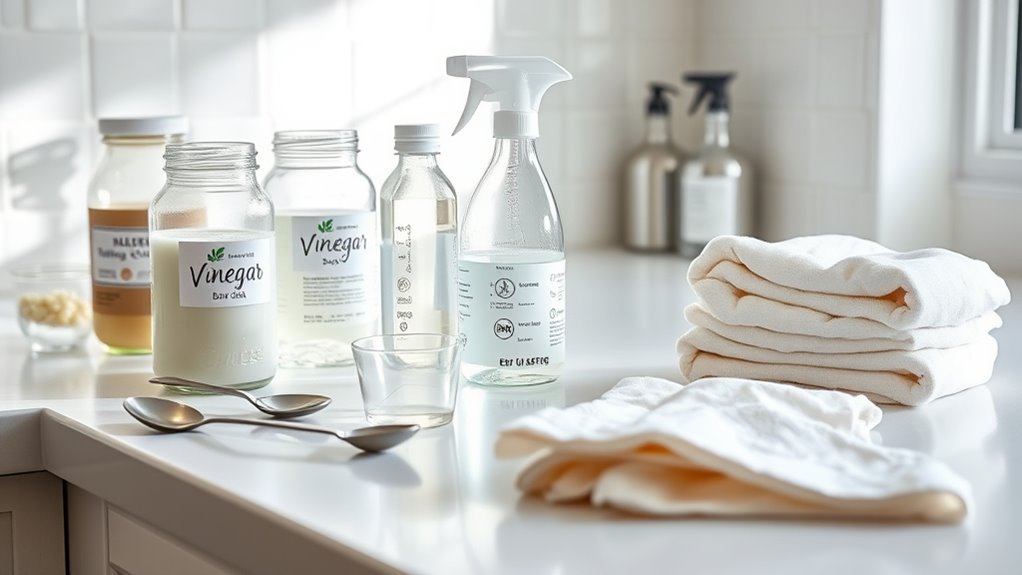
Start by setting up a clean, organized workspace with all your ingredients, tools, and protective gear nearby. Make sure the area is well-ventilated to avoid inhaling fumes from your cleaning agents. Always wear gloves and goggles, and clearly label your solutions to keep everyone safe. Considering the importance of using safe and non-toxic ingredients, it’s essential to select natural components for your eco-friendly cleaning products. Additionally, being aware of electric bike horsepower can inspire you to choose powerful yet efficient tools for your cleaning tasks.
Clear Workspace Setup
Setting up your workspace properly is vital for safe and efficient DIY cleaning product creation. Start with a clean workspace, free of clutter, and guarantee good ventilation to prevent inhaling fumes. Always wear protective gear such as safety gloves and glasses to guard against skin and eye irritation from acids, alkalis, or essential oils. Use clearly labeled, dedicated mixing containers for each solution to prevent mix-ups or accidental reactions. Keep spill prevention tools, like cloths and absorbent materials, nearby, along with a fire extinguisher and access to running water for emergencies. Proper ingredient storage is indispensable—store chemicals separately and follow recipe instructions carefully. Avoid mixing incompatible ingredients like vinegar and baking soda to assure safety throughout your DIY process.
Safety Gear Usage
When handling concentrated cleaning ingredients, always wear gloves and safety goggles to protect your skin and eyes from irritation. Proper protective gear is essential during chemical handling to prevent accidents. Guarantee your workspace safety by working in a well-ventilated area—open windows or use exhaust fans to disperse fumes from vinegar, essential oils, and other substances. Prepare solutions on a stable, flat surface away from children and pets, and label clearly all containers to avoid confusion. Remember, safety goggles shield your eyes, and gloves protect your skin from chemical contact. Here’s a quick reminder:
| Protective Measures | Benefits |
|---|---|
| Safety goggles | Eye protection |
| Gloves | Skin protection |
| Ventilation | Fumes dispersal |
| Label Clearly | Prevents chemical mix-ups |
Creating Versatile All-Purpose Cleaners
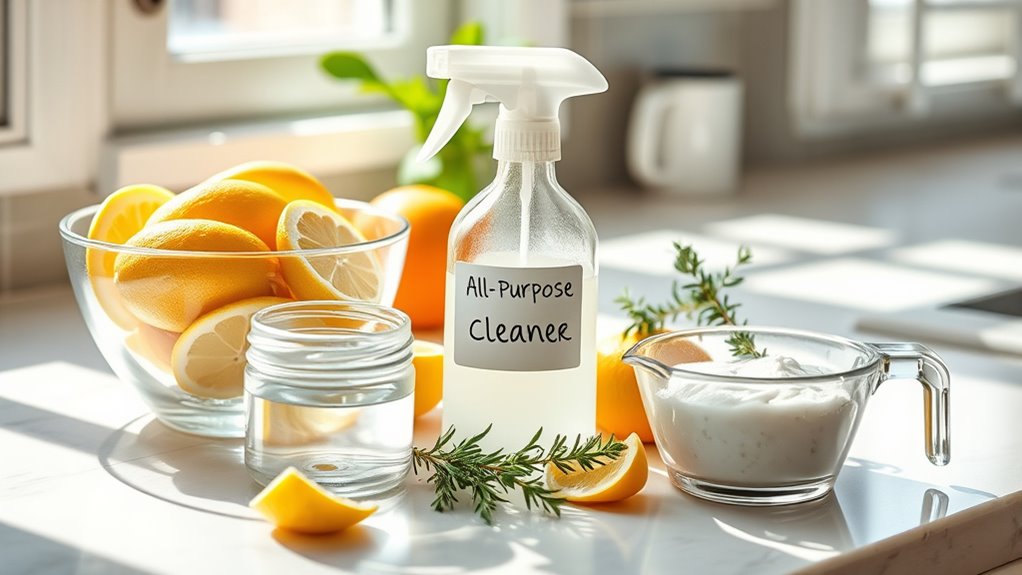
Creating a versatile all-purpose cleaner at home is simple and effective. You can make a powerful homemade disinfectant using just 2 cups of white distilled vinegar, 2 cups of water, and 20-30 drops of essential oils like lemon or tea tree. Warming the mixture slightly in the microwave boosts its cleaning power without damaging the essential oils’ benefits. This DIY cleaner works as a multisurface spray, suitable for countertops, floors, and even windows and mirrors. To use, pour it into a spray bottle and shake well before each use to keep the ingredients well mixed. Applying the cleaner with a spray ensures even coverage and efficient cleaning. With this homemade cleaner, you’ll have an eco-friendly, cost-effective solution for multiple cleaning tasks around your home.
Making Specialized Cleaners for Windows, Mirrors, and Glass
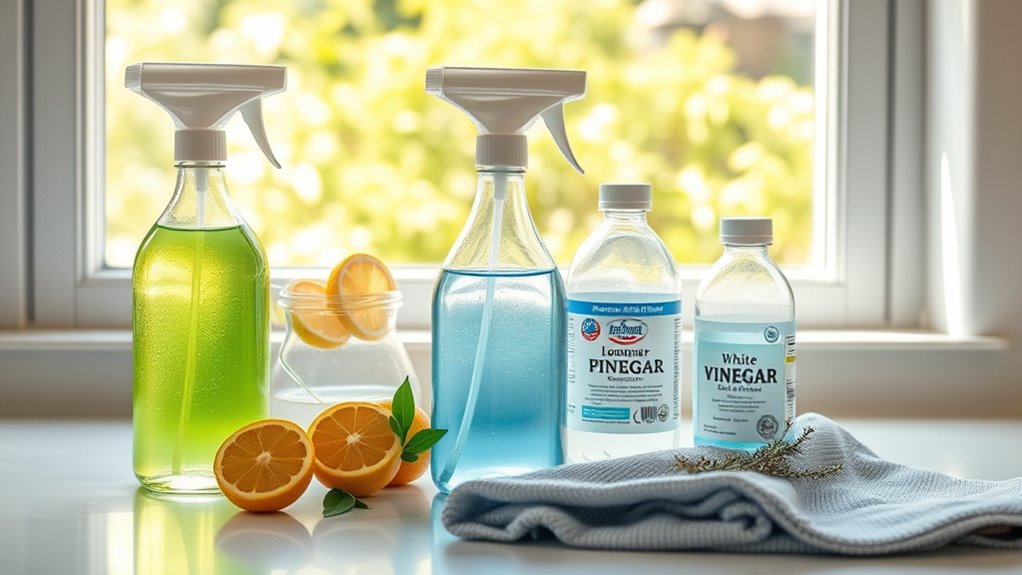
Looking for a streak-free way to clean your windows, mirrors, and glass surfaces? Mix 1/4 cup of distilled white vinegar with a quart of water, then add a tablespoon of cornstarch. Pour the solution into a spray bottle and shake well before each use to guarantee proper mixing. Spray it onto your windows and mirrors, then wipe with a lint-free cloth or newspaper for a crystal-clear finish. For extra shine and antibacterial benefits, add 10 drops of essential oils like lemon or eucalyptus to the mixture. Avoid using this glass cleaner on natural stone surfaces such as granite or marble, as vinegar can cause damage. This simple, eco-friendly cleaner provides a streak-free shine without harsh chemicals, making your glass surfaces sparkle naturally.
Formulating Effective Bathroom and Toilet Cleaners
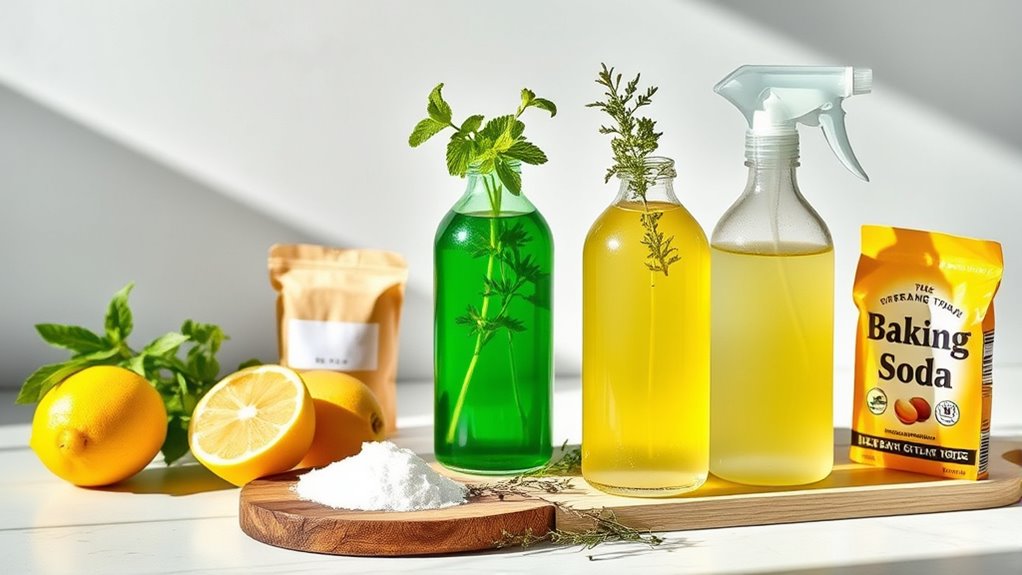
Formulating effective bathroom and toilet cleaners with natural ingredients is simple and eco-friendly. For a toilet bowl cleaner, sprinkle 1/4 cup baking soda inside, then pour in 1 cup vinegar to fizz and loosen grime. Let it sit for 30 minutes before scrubbing. To remove mildew and mold, spray a mixture of 3 cups hot water, 1/2 cup vinegar, 1/4 cup castile soap, and a few drops of tea tree oil—this acts as a disinfectant and mildew remover. For drain cleaning, pour 1/2 cup baking soda down the drain, add 1/2 cup vinegar, cover, and wait 30 minutes before flushing with boiling water. To clean soap scum, apply a baking soda paste and rinse with a vinegar-water solution. These natural solutions effectively keep your bathroom fresh and clean.
Crafting Safe and Natural Kitchen and Floor Cleaners
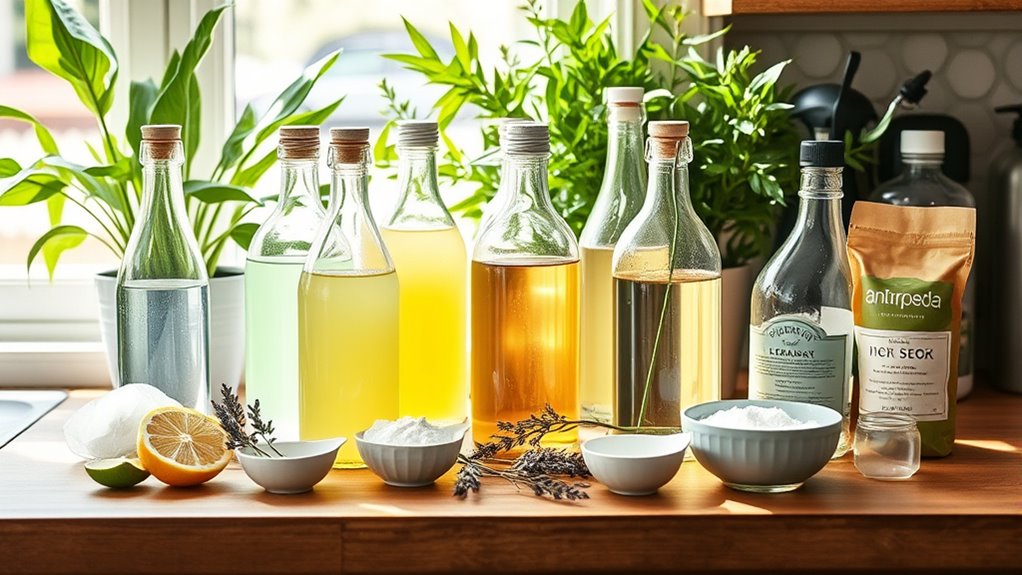
Building on your knowledge of natural bathroom cleaners, you can easily craft safe and effective solutions for your kitchen and floors using simple ingredients. Combine 1/2 cup white vinegar, 2 cups water, and 10-15 drops of essential oils like lemon or tea tree to create a versatile cleaning solution. Heating the mixture in a glass container boosts its cleaning power, helping to dissolve grease and grime effectively. Apply the homemade cleaner with a microfiber cloth or mop, then wipe or rinse for a streak-free finish on countertops, tiles, and hardwood floors. For stubborn stains, let the solution sit for 5-10 minutes before scrubbing. Remember, avoid using vinegar on natural stone or waxed surfaces, and always test a small area first to guarantee safety.
Developing Laundry and Fabric Care Products
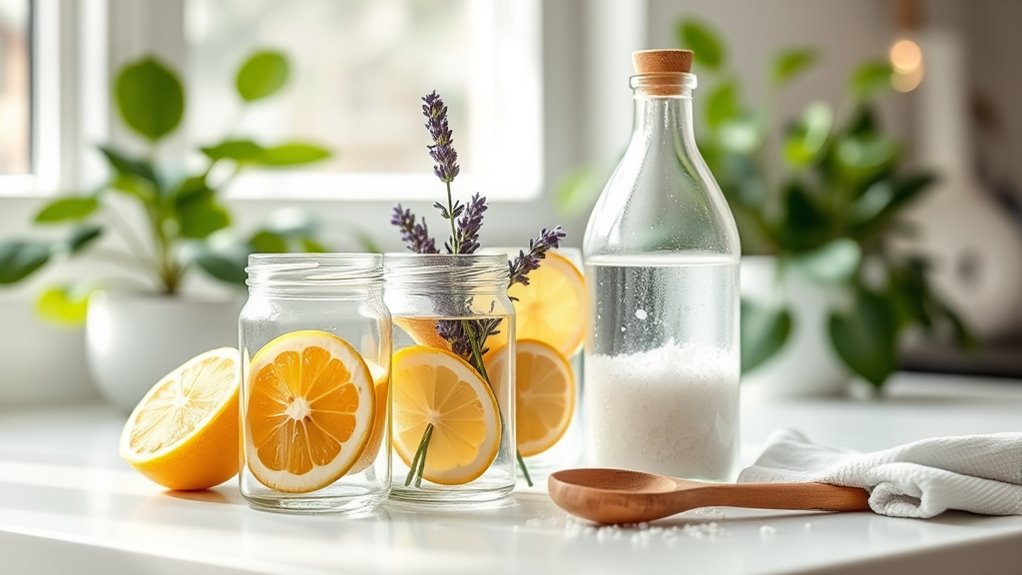
Creating your own laundry and fabric care products is an effective way to keep clothes fresh while avoiding harsh chemicals. You can craft a simple DIY laundry detergent by mixing washing soda, baking soda, and castile soap, with optional essential oils for a natural scent. Picture a jar filled with:
- Powdered washing soda and baking soda, ready to tackle dirt
- Liquid castile soap, gentle yet effective for cleaning
- A splash of vinegar, acting as a natural fabric softener
For stain removal, apply a baking soda paste directly on spots or pre-soak with hydrogen peroxide for tough stains. Reusable fabric softeners, like soaking old T-shirts in vinegar and conditioner, reduce waste and synthetic chemical exposure. Proper storage ensures your products stay effective.
Incorporating Essential Oils for Enhanced Cleaning and Scent
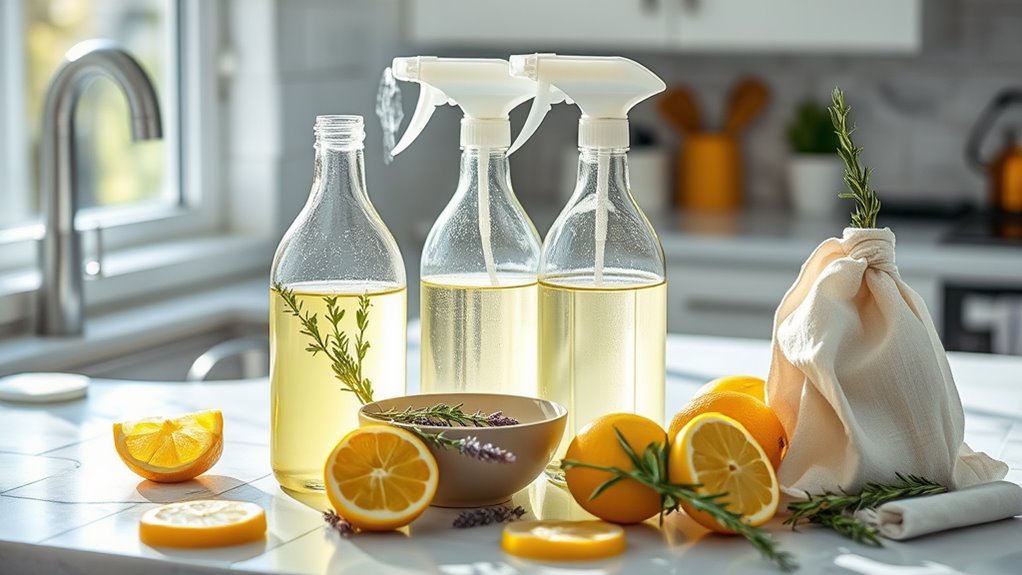
Adding essential oils to your homemade cleaning products not only enhances their scent but also boosts their cleaning power. Essential oils like tea tree, eucalyptus, and lemon have natural antimicrobial properties that strengthen your cleaning solutions, making them more effective. They add a fresh, natural scent, reducing the need for synthetic fragrances and supporting eco-friendly cleaning. When using essential oils, proper dilution is key—typically 10 to 30 drops per 16 ounces of cleaner—to prevent skin irritation and surface damage. Oils like lavender and peppermint also offer antifungal and antibacterial benefits, improving hygiene. Beyond their cleaning benefits, these oils provide aromatherapy, creating a calming or invigorating atmosphere during chores. Incorporating essential oils elevates your homemade cleaners into multisensory, eco-conscious solutions.
Tips for Storing, Labeling, and Using Your Homemade Cleaners
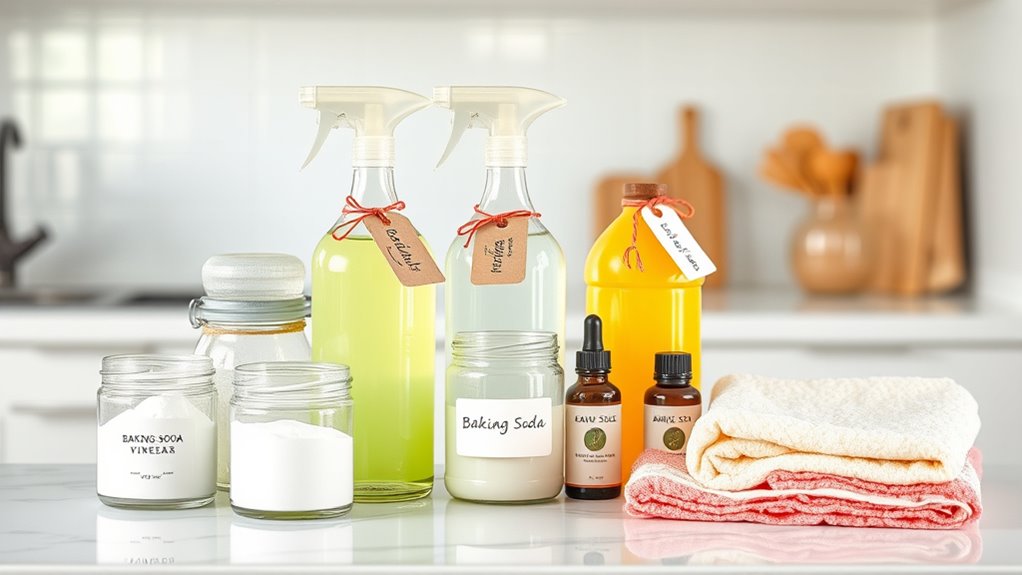
Proper storage and clear labeling are essential to keep your homemade cleaners safe and effective. Store your cleaning solutions in airtight containers, preferably glass, to prevent leaks and preserve potency. Use waterproof labels with detailed ingredients, expiration dates, and preparation dates to track freshness and ensure safe use. Labels should also include usage instructions and dilution ratios to avoid surface damage. Store all cleaning solutions out of children’s and pets’ reach, preferably in a locked cabinet or high shelf, to child-proof your space. Regularly check for discolored or expired solutions, disposing of them properly. Remember these key points:
- Labels that withstand moisture and handling
- Airtight containers for ideal storage safety
- Clear instructions for correct usage
Frequently Asked Questions
How Can I Make My Own Eco-Friendly Cleaning Products?
To make your own eco-friendly cleaning products, start by gathering natural ingredients like vinegar, baking soda, castile soap, and essential oils. Mix these ingredients in simple recipes, such as vinegar and water for all-purpose cleaner or baking soda with soap for scrubbing. Use olive oil and vinegar for furniture polish, and combine baking soda and vinegar for drain cleaning. These DIY solutions are effective, safe, and gentle on the environment.
How Do I Create My Own Cleaning Products?
You might think creating cleaning products is complicated, but it’s actually as simple as mixing everyday household ingredients. You can turn vinegar infused with citrus peels into a powerful, fragrant cleaner, or combine baking soda, castile soap, and water for gentle scrubbing. Use diluted hydrogen peroxide for disinfecting, and store everything in labeled reusable bottles. With a little experimentation, you’ll soon master eco-friendly cleaning that’s safe, effective, and budget-friendly.
How to Make Homemade Natural All-Purpose Cleaner?
To make a homemade natural all-purpose cleaner, start by mixing 1/4 cup distilled white vinegar, 12-20 drops of your favorite essential oil, 1 teaspoon castile soap or washing soda, and 2 cups cooled, boiled, or distilled water in a spray bottle. Fill with more water, shake well, and label it clearly. Use it on surfaces like countertops, sinks, or glass, shaking before each use for best results.
How to Make Non-Toxic House Cleaner?
Ever wonder how to make a non-toxic house cleaner? You can create a versatile, safe solution by mixing half a cup of white vinegar with two cups of water, adding 20-30 drops of essential oil for scent. For tougher stains, combine lemon juice and baking soda. These simple ingredients act like silent heroes, cleaning your home effectively without harmful chemicals, keeping your space safe and sparkling.
Conclusion
Making your own eco-friendly cleaners is like planting seeds for a healthier planet—you nurture your home and the environment at the same time. With simple ingredients and safety tips, you can create effective, natural solutions that protect your family and the Earth. Once you get started, you’ll see how satisfying it is to transform everyday items into powerful cleaners. Embrace this eco-friendly journey, and watch your home sparkle with the goodness of nature.


